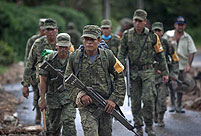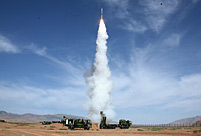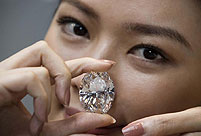 |
| A foreign jockey rides on his horse before a race.Photos by Bai Menghechaolu / For China Daily |
Teo cites the successful example of the annual Dubai World Cup, which does not allow wagering. The $10 million-plus bonus for a single race makes it probably one of the most luxurious sports events in the world.
"We cannot compare with Dubai right now, but as China has a great potential horse-breeding market, the bonus will increase little by little," says the Malaysian, who confirms the event will be held annually.
Still, Dugarjavin Manglai, vice-president of Hohhot-based Inner Mongolia Agricultural University and secretary-general of the China Horse Industry Association, worries these fine horse breeds would be too removed from people's daily life and thus lack a solid foundation of fans if they were limited to high-level competitions.
He expects a big market for these horses, accompanied by the public's full participation, and reveals that China is second only to the United States in raising the largest number of horses.
"I don't believe betting on horseracing will surely lead to gambling," he says. "It can copy the model of a sports lottery, but relevant rigid regulation is a must. Before policies are ready, it would be premature to promulgate a horseracing lottery."
Nevertheless, Teo Ah Khing adds that a promising scenario, whatever its form, will only be nurtured by a sound thoroughbred nursery industry in China.
"Grasslands in Inner Mongolia are home to a large number of ranches and horses, it should be where the industry begins in China," he says. "A self-sustainable system will also become a driver of jobs. The example here can be a guideline for the whole nation."
Louis Romanet, President of the International Federation of Horseracing Authorities, a Paris-based organization overseeing member countries' breeding, racing, and wagering rules, cited his homeland of France as an example while attending CECF. More than 75,000 people benefit directly from the horse industry in his country, 45,000 in the relevant agricultural activity, he says.
"The horse industry in France is in a situation of full employment and creates new jobs every year for young people," he says, expecting the number will be much more in China if a modern nursery industry is built up.
China is not among IFHA's 60 or so members. Romanet vaguely excluded the possibility that China would soon get on board by saying that it takes a few years for a new applicant to have its national organ and a complete legal system regulating horseracing, which is essential to enter his organization.
A cheerful fact is that the Ministry of Agriculture is to release the country's first detailed technical guidance system for the equestrian industry in 2014.
Sun Wei, an assistant to the CEO of Pengxin Group, a Shanghai-based real estate developer, says that the establishment of a thoroughbred nursery will launch a valuable industry chain all over the country. "It will encourage the development of feedstuff produce, racehorse training, auctions, jockey clubs, tourism and many other business sectors."
The group, which has bought 16 horse ranches in New Zealand for dairy produce, will soon construct China's largest horseracing course equipped with a thoroughbred nursery center. Referring to the world's highest standard, the center near Daqing Mountains in northern Hohhot will cover a total area of 2,000 hectares. Construction of the main course is scheduled to be finished before 2017.
"Since we have owned some business in agriculture and had experiences overseas, it won't be strange to set foot into the equestrian industry," Sun says.
However, Sun adds it remains risky to venture into a completely new field.
"We've set a term of three to five years to see whether the nursery industry can be successful," he says. "Our future plan to build more courses will depend on experiments in Hohhot. If everything goes well, I believe numerous racecourses will mushroom nationwide.
"The mainland has the capacity to become a base providing top-level racehorses for Hong Kong, Japan, and Singapore. I hope Hohhot can be an international hub for racehorse breeding in the near future."
A major threshold for exporting of thoroughbreds is the quarantine issue. The country is still considered by foreign authorities unsafe from infectious equestrian diseases, so foreign horses have only one-way tickets entering the border.

 Storms leave 97 dead, 58 missing in Mexico
Storms leave 97 dead, 58 missing in Mexico New model of indigenous surface-to-air missiles testfired
New model of indigenous surface-to-air missiles testfired  118.28-carat diamond to be auctioned in HK
118.28-carat diamond to be auctioned in HK Maternal love under streetlight
Maternal love under streetlight Naked foreign student sits in the middle of a road in Haikou
Naked foreign student sits in the middle of a road in Haikou  Colorful Yunnan: Enjoy the natural beauty
Colorful Yunnan: Enjoy the natural beauty Harbin named Chinese city with most beautiful women
Harbin named Chinese city with most beautiful women New college students' military training in Guangzhou
New college students' military training in Guangzhou Rugby girls
Rugby girls PLA's 38th Group Army conduct training
PLA's 38th Group Army conduct training Residences of the royal house of Savoy
Residences of the royal house of Savoy The last days of Wan Aihua
The last days of Wan Aihua Highlights at 12th National Games of China
Highlights at 12th National Games of China Beijing Film Academy welcomes freshmen
Beijing Film Academy welcomes freshmen Large mahjong party sets new world record
Large mahjong party sets new world recordDay|Week|Month